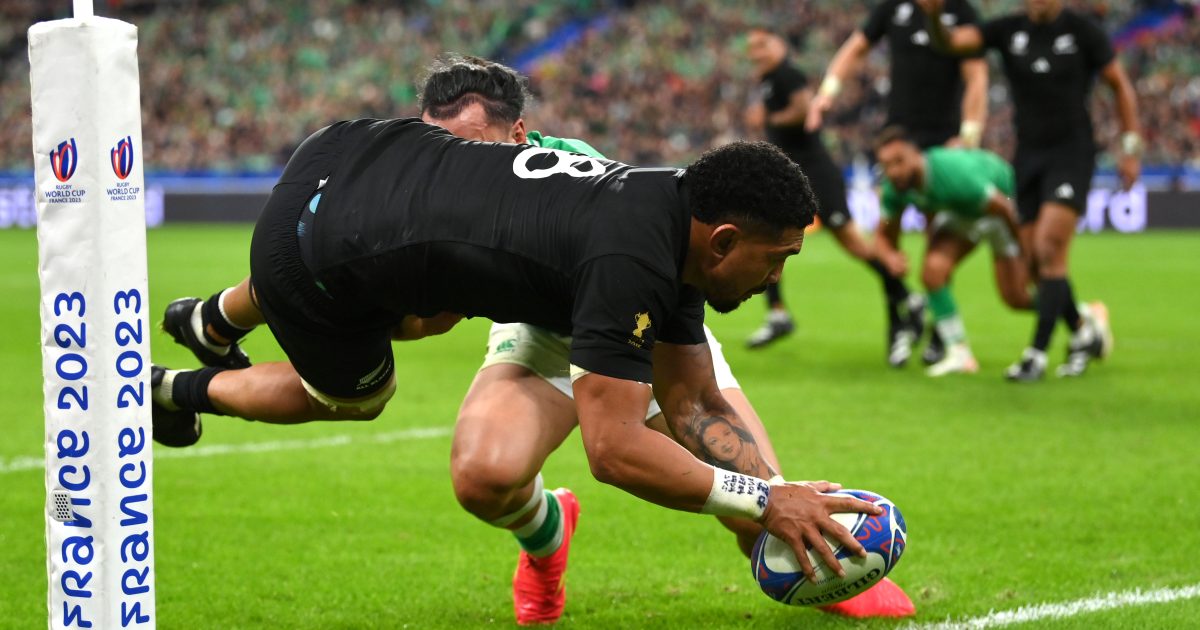La Nouvelle-Zélande en demi-finale, l'Irlande maudite

La Nouvelle-Zélande a désormais remporté neuf de ses dix quarts de finale de la Coupe du Monde de Rugby (seule exception en 2007 contre la France), en battant l’Irlande 24-28 samedi 14 octobre au Stade de France à Saint-Denis.
Une immense déception pour l’Irlande, équipe n°1 au monde, qui n’a jamais réussi à passer le stade des quarts de finale en Coupe du Monde de Rugby ; celui-ci étant son huitième. Il y a quatre ans, la Nouvelle-Zélande avait déjà battu l’Irlande à Tokyo (46-14) à ce stade de la compétition.
Mais cette année, le XV du Trèfle partait favori après être sorti invaincu de la phase de poule, la Nouvelle-Zélande avait mal débuté son mondial en s’inclinant face à la France dans le match d’ouverture.
Un combat intense
Le combat a été à la hauteur des attentes. Dès le haka, le ton était donné. Inaudibles, les Néo-Zélandais ont subi à la fois le bruit assourdissant des supporters irlandais et la formation d’un huit par les joueurs irlandais, en hommage à Anthony Foley, ancien entraîneur du Munster, numéro 8 à l’époque où il était joueur (62 sélections entre 1995 et 2005), décédé à Paris il y a sept ans, à deux jours près.
Et s’il fallait résumer cette intensité par une autre action, ce seraient sans doute ces 37 phases de jeu dans les cinq dernières minutes qui se sont soldées par un ballon récupéré par les Néo-Zélandais. Cruelle fin.
Une action folle qui concluait un match immense qui avait commencé de la même manière : 30 phases de jeu autour de la ligne des cinq mètres pour une action qui ne s’est concrétisée que par un but de pénalité pour la Nouvelle-Zélande (7e).
Un début de match dominé par la Nouvelle-Zélande
Les vingt premières minutes ont été dominées par les All Blacks, passant un but de pénalité à 50 mètres (Jordie Barrett, 13e) et aplatissant en coin (Leicester Fainga’anuku, 20e) après une incroyable combinaison partie d’une chandelle de Beauden Barrett relayée par un échange entre les deux centres.
Pas en reste, l’Irlande a tenté de percer le mur noir à plusieurs reprises jusqu’à ce que l’inarrêtable Bundee Aki s’affale dans l’en-but. Après un essai de Ardie Savea tout en plongeon (impérial aussi bien en attaque qu’en défense), le carton jaune infligé à Aaron Smith (36e) pour jeu déloyal conduira à l’essai de Jamison Gibson-Park (38e) après une touche bien négociée par Peter O’Mahony pour ramener l’Irlande à un point de la Nouvelle-Zélande (17-18).
Une stat pouvait laisser deviner la suite : la Nouvelle-Zélande avait toujours mené à la mi-temps en quarts de finale de Coupe du Monde de Rugby alors que ça n’a jamais été le cas pour l’Irlande.
Fin de match étouffante
Il faudra attendre la 54e minute pour que la Nouvelle-Zélande se donne un peu d’air avec un franchissement de Richie Mo’unga après une touche sur la ligne des 40 néo-zélandais. Rien qu’une passe servira à Will Jordan pour marquer son quatrième essai en autant de matchs, transformé à 49 mètres par Jordie Barrett ; une habitude pour le trois-quarts centre.
Alors que Sexton manquait de réduire l’écart de trois points avant l’heure de jeu, l’Irlande choisit quelques minutes plus tard la touche plutôt que les poteaux pour la troisième fois depuis le début de la rencontre. Un maul d’une puissance rare enfonça littéralement la défense des All Blacks. L’essai de pénalité accordé à cause du talonneur Codie Taylor (64e) ramenait le XV du Trèfle à un point pour une fin de match suffocante.
Les All Blacks ont réussi à tenir à 14 contre 15, Barrett passant une nouvelle pénalité à 42 mètres (69e). Sans le savoir, il venait de sceller le score, 24-28.
Les triples champions du monde (1987, 1999, 2011) défieront l’Argentine vendredi 20 octobre à 21h au Stade de France pour la première demi-finale.















































